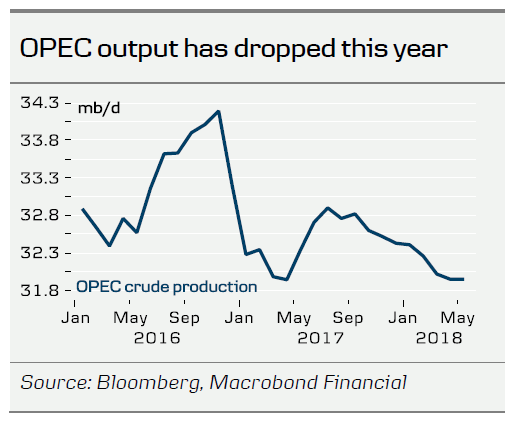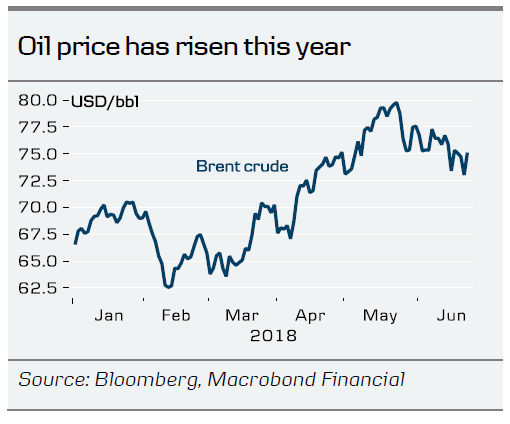- OPEC today agreed to increase output by 1mb/d to reduce ‘over compliance’ with the current output agreement.
- The price on Brent crude rose above USD75/bbl on the news, as the market had feared OPEC would agree to larger output hike.
- It remains unclear what OPEC will do after the current deal expires at the end of the year – a decision on this will likely be made at next meeting on 3 December.
The Organisation of Petroleum Exporting Countries (OPEC) today agreed to lift output by 1mb/d effective from 1 July. The aim of the deal is to return total compliance to the current output agreement to 100%. Compliance has been well above 100% this year since some countries, notably Venezuela, have seen a drop in production. OPEC is set to hold the next biannual meeting on 3 December. Finally, the Republic of Congo has become an official member of OPEC.
Since November 2016, OPEC has kept production lower to support a tighter oil market balance, reduce global oil inventories and support higher oil prices. This year oil prices have rallied to the highest level since 2014 in part because OPEC has become ‘over compliant’ with the production cuts, due notably to falling production in Venezuela at a time when demand has been on the rise on the back of higher global economic activity. This development paved the way for a deal to return supply to the market and reduce ‘over compliance’. Essentially, OPEC is raising production to maintain the current output agreement, which runs until end of the year.
Heading into the meeting there was disagreement within OPEC on the strategy going forward. On one side, Saudi Arabia favoured output hikes, while Iran and Venezuela on the other hand stood in opposition to this strategy. Iran and Venezuela are both limited in the ability to raise production above current levels and thus do not stand to gain from an output hike.
The price of Brent crude rose about USD1/bbl to above USD75/bbl on the news. The fact that oil prices are rising when OPEC is returning supply to the market reflects a concern in the market heading into the meeting that OPEC would agree to raise output further than the level needed to ensure 100% compliance. For the rest of the year, the deal today reduces the upside risk to prices from the risk of lower output in, e.g. Iran and Venezuela, since OPEC now effectively has established a mechanism which opens the way for other countries to increase production correspondingly. It remains unclear what OPEC will do when the current deal expires at the end of the year. A decision on this will likely be made on 3 December. The deal today does not affect our current forecast for Brent to average USD72/bbl in H2 and USD73/bbl in 2019.


